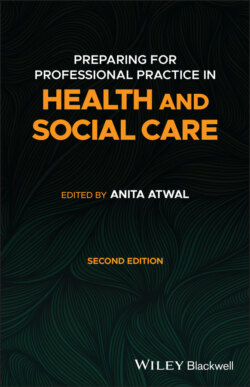Читать книгу Preparing for Professional Practice in Health and Social Care - Группа авторов - Страница 9
Professionalism
ОглавлениеProfessionalism has been difficult to define. It has many attributes claimed, and these attributes often change given the author and the times. There are however common themes; professionals are expected to demonstrate a key set of behaviours that reflect the values, knowledge base, and attributes of the profession in which they work. These standards are usually explicit within in each profession and appear as a code of standards, proficiency, or conduct. They are informed by more than the law of the land but also by ethical considerations. Integrity and altruism are expected and this is particularly important in healthcare.
Clinical reasoning and decision-making feature consistently. AHPs are expected to have a specialised, bounded, and privileged bank of knowledge. It is, by its very nature, not easily understood by others and thus professionals are expected to interpret that knowledge base for the betterment of others. To summarise, a professional is asked to behave to a set of standards and interpret a specific bank of knowledge, delivering that interpretation in the best interests of their clients or patients.
We are concerned here with the knowledge base as an expression of professionalism. Simply obtaining that knowledge base is a key barrier to entry for the professions. This is reflected in the high tariffs required by higher-education institutes and regulators for admission into healthcare courses and the accreditation of healthcare courses themselves. There is also the task of maintaining and improving the working knowledge that each professional carries. When regulators demand that registrants behave professionally, part of that demand is that they keep their knowledge up to date. This is demonstrated by the regulatory oversight of a continual professional development system without which AHPs are not able to successfully apply for re-registration.
The acquisition and maintenance of a knowledge base therefore is a key characteristic of a professional. Moreover, society places a trust in professionals to interpret this knowledge for them (van Mook et al. 2009). It is this interpretation that is the subject of this chapter.
